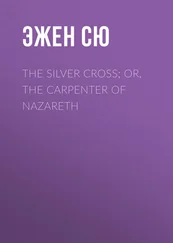Эжен Сю - The Sword of Honor; or, The Foundation of the French Republic
Здесь есть возможность читать онлайн «Эжен Сю - The Sword of Honor; or, The Foundation of the French Republic» — ознакомительный отрывок электронной книги совершенно бесплатно, а после прочтения отрывка купить полную версию. В некоторых случаях можно слушать аудио, скачать через торрент в формате fb2 и присутствует краткое содержание. Жанр: literature_19, foreign_antique, foreign_prose, на английском языке. Описание произведения, (предисловие) а так же отзывы посетителей доступны на портале библиотеки ЛибКат.
- Название:The Sword of Honor; or, The Foundation of the French Republic
- Автор:
- Жанр:
- Год:неизвестен
- ISBN:нет данных
- Рейтинг книги:4 / 5. Голосов: 1
-
Избранное:Добавить в избранное
- Отзывы:
-
Ваша оценка:
- 80
- 1
- 2
- 3
- 4
- 5
The Sword of Honor; or, The Foundation of the French Republic: краткое содержание, описание и аннотация
Предлагаем к чтению аннотацию, описание, краткое содержание или предисловие (зависит от того, что написал сам автор книги «The Sword of Honor; or, The Foundation of the French Republic»). Если вы не нашли необходимую информацию о книге — напишите в комментариях, мы постараемся отыскать её.
The Sword of Honor; or, The Foundation of the French Republic — читать онлайн ознакомительный отрывок
Ниже представлен текст книги, разбитый по страницам. Система сохранения места последней прочитанной страницы, позволяет с удобством читать онлайн бесплатно книгу «The Sword of Honor; or, The Foundation of the French Republic», без необходимости каждый раз заново искать на чём Вы остановились. Поставьте закладку, и сможете в любой момент перейти на страницу, на которой закончили чтение.
Интервал:
Закладка:
"I also, my dear Franz, am happy to find in you a relative and a friend," John made answer, no less affectionately than the Prince. "Chance has made you of the sovereign race, yet you fight for the freedom of the people."
"My dear John, I am, like you, a son of Joel, the brenn of the tribe of Karnak. More than once, across the ages, the republican ardor of the old Gallic blood has roused itself in my plebeian race – although, by an uncouth stroke of destiny, it has been muffled under a sovereignship and a grand-ducal crown."
"Aye, we are indeed of the same blood – your words, your acts prove it," said the blind father. "Your hand – let me also press your hand, my brave young man."
Franz stepped toward Monsieur Lebrenn. "I am deeply sensible of these marks of fatherly good-will," he said. "They console me for the rigors of my own father, who has banished me from his presence and forbade me from his states."
"What can have been the cause of such severity!" rejoined the old man in surprise. "What is your crime?"
"My crime?" replied Franz, with a slight smile. "My crime consists in attaching scant weight to our sovereignty. I tried more than once to bring my father to more just, more modest appreciation of our origin. 'Did not our family,' I said to him, 'come into its power through the audacity of an adventurer? May the earth lie light on our ancestor Gaëlo! But he was the companion and pupil of old Rolf, a frightful bandit, who, each spring, came to ravage the banks of the Loire and the Seine.' My father's answer was that all the crowned heads of the world, big or little, were sprung from no less savage a beginning. To which I retorted that there would come the day when the people, enlightened as to the origin of their pretended masters, would tire of being the exploitable property, the forced laborers, the chattels of a few royal families whose founders were fit for the galleys or the gibbet; and that I feared for kings, princes, emperors and Popes lest, by some terrible reversal of things here below, the people, driven to the limit of endurance, should treat them as their august founders deserved, and the most of them to this very day deserve to be treated."
"In good sooth," said John Lebrenn, laughing, "that language was surely severe for a Prince to hold – and to monarchs!"
"So, my dear John, my father grew furious at my language. In fine, I concluded by urging him to set a great example to the other princes of the Germanic Confederation, by laying aside his grand-duchy. 'Lay aside,' I said to him, 'a power stained with crime in its very origin, and lead the people of your states and the other German principalities to unite in a republic like the cantons of the Swiss, or the provinces of the Netherlands. The Poles, the Hungarians, the Moldavians, the Wallachians, enslaved by Prussia, by Russia and by Austria, but trained to republicanism by their old elective customs, will soon be attracted by the example and the cry of liberty! Then the three last powerful despotisms of Europe – Prussia, Austria, and Russia – will find themselves hemmed in, threatened by free peoples, and we shall soon have an end of these last lairs of royalty!'"
"That was preparing for the future!" the old man exclaimed. "The United States of Europe! The Universal Republic!"
"But my father preferred to hang to his throne," continued Franz. "Then convinced of the futility of my appeals, and holding the duty of a citizen in precedence over that of a son, I passed from word to action. With all my power and by every means at my disposal I propagated in Germany, its cradle, the society of the Illuminati; my father banished me."
"Your account of yourself, Monsieur Gerolstein, deepens still more the esteem in which I needs must hold you," nodded the old man.
"These words of regard are doubly precious, Monsieur Lebrenn. They shall add their bonds to those of the relationship already existent between us. It is in the name of those very bonds that I am about to reveal to you one of the motives of my visit – a cordial offer of my services. It is a blood-relation, it is a friend who speaks, Monsieur Lebrenn; do not then, I beg of you, yield to a susceptibility in itself honorable, but perhaps exaggerated. You were a printer. For long your labor provided for the wants of your family. But now you have lost your sight in prison; you are feeble. Madam Lebrenn is old. What are to be your resources against the material needs of existence?"
"My health, thanks to God, is not so weakened that I can no longer work," replied Madam Lebrenn brightly. "The presence of my husband will double my strength."
"And I, mother," added John, "am I not here by you? Reassure yourself, Franz, my father and mother shall want for nothing. We are, nevertheless, deeply sensible of your offer. We thank you, but we decline, firmly."
"John, allow me to interrupt you," began the Prince. "I know from your sister what an industrious and skilful workman you are. But, please you, let us look at the situation together. Have you been able to go to your shop for the last four days? Considering the great events close at hand, of which the taking of the Bastille is but the precursor and sign, can you count on the full disposition of your time? The struggle once engaged between the nation and the royal power, will it not continue impetuous, implacable? Is it at a season when the liberty of the people trembles in the balance that you ought to abandon the field of battle? And still your family must live, and it can only live by your daily labor."
"Often have I said," exclaimed Victoria, "that the people has never had the time to complete the revolutions it began! or else, if they were accomplished promptly, decisively and overwhelmingly, the time has always been lacking to defend the conquest, to maintain it, consolidate it, and fructify it. The people's enemies, on the other hand, gentlemen of leisure, free from care, kings, priests, nobles or tax-farmers, have awaited, under cover, the certain hour to ravish from the people the benefits of its short-lived conquest."
"Alas, it is but too true," assented her father. "The time has always been lacking – the time and the money."
"Such is the fatal verity!" continued Gerolstein. "Would that verity could convince the people that if they can, which is rarely the case, make some little savings from their meager pay, it is not at the tavern they should spend them. For those savings of the worker should, when the day arrives, insure to him a portion of the necessary leisure to emancipate himself. And if he has been able to put aside nothing, he is in error to yield to an exaggerated scruple of delicacy and repulse the aid fraternally offered to him by his friends in order that he may be assured one of the means to clinch his victory."
"A singular occurrence which I witnessed this morning," responded the young artisan, "strikingly reinforces your argument. One of my friends, a journeyman carpenter, and several others of our comrades, were gathered at break of day in the neighborhood of the Bastille, awaiting the signal for the attack. A man simply clad, and with an open countenance, accosted them: 'Brothers,' said he, 'you go to-day to fight for your liberty. It is your duty. But to-day you will not go to your shops, and will earn nothing. If you have families, how will they live to-morrow? If you are bachelors, what will you live on yourselves? Allow then, one of your unknown friends to come to your aid as a brother. It is not an alms that I offer; I only assure you your leisure for this great day, by delivering you from your cares for the morrow.'"
"That 'unknown friend' was the banker Anacharsis Clootz, the treasurer of the Voyants, and rich enough in his own name to aid our brothers for a long time to come," explained Franz in an undertone to Victoria, without interrupting John, who continued:
Читать дальшеИнтервал:
Закладка:
Похожие книги на «The Sword of Honor; or, The Foundation of the French Republic»
Представляем Вашему вниманию похожие книги на «The Sword of Honor; or, The Foundation of the French Republic» списком для выбора. Мы отобрали схожую по названию и смыслу литературу в надежде предоставить читателям больше вариантов отыскать новые, интересные, ещё непрочитанные произведения.
Обсуждение, отзывы о книге «The Sword of Honor; or, The Foundation of the French Republic» и просто собственные мнения читателей. Оставьте ваши комментарии, напишите, что Вы думаете о произведении, его смысле или главных героях. Укажите что конкретно понравилось, а что нет, и почему Вы так считаете.











